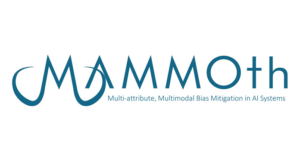Why we do research?
From the very beginning, finding solutions to issues that people and businesses may face in the future connected world, has always been at the heart of IDnow’s concerns. This is the reason why IDnow has built an in-house R&D department early on to decipher tomorrow’s challenges as well as opportunities regarding document analysis, fraud detection, self-sovereign identity, and biometric ethics and to develop innovative solutions to resolve or approach them.
Our team, made up of highly qualified researchers and R&D engineers, specialized in computer science, artificial intelligence, image processing, and biometrics, carries out ambitious research projects on topics such as the development of a European digital identity or the prevention of bias in artificial intelligence. They work hand in hand with academic research and participate in international conferences where they share their scientific findings with the scientific community. Always with the goal to stay ahead of the latest developments in the field and making the connected world a safer place.

Our research areas

IDnow provides expertise in the following topics:
- ID document analysis and verification
- Biometry (facial recognition, Presentation Attack Detection)
- Digital identity
- Optical character recognition
- Deepfake detection (fight against fraud, disinformation)
Our collaborative research projects


ACHILLES 2024 – 2028
The Olympics motto “Faster, Higher, Stronger” also applies to recent impressive AI advancements, but now is the time to update it to “Lighter, Clearer, Safer”. ACHILLES, funded under the Horizon Europe research programme, aims to build an efficient, compliant, and trustworthy AI ecosystem.
Through innovative techniques and methodologies based on the collaboration of a multidisciplinary team of 16 partners from 10 countries, ACHILLES will foster a strong AI ecosystem that respects privacy, security, and ethical principles across various sectors. By validating the results in real use cases (including healthcare, ID verification, content creation and pharmaceuticals), ACHILLES will showcase its practical applicability and potential for widespread adoption. IDnow will contribute to the technical development, proposing methods to rely as little as possible on real data to train its identity verification algorithms, and provide end-user feedback and evaluation of the overall solution.
MAMMOth 2022 – 2025
MaMMOth aims to study the biases inherent in the use of AI in task automation and decision making. Although widely used for various purposes, it can inadvertently discriminate against minorities, making the verdicts of algorithms inaccurate or inoptimal for these populations.
MAMMOth will offer a toolbox to identify, avoid and resolve these biases at different levels (data preparation, algorithms, etc.), considering the possible multimodality of the data as well as the entanglement of different biases.
IDnow will apply the developed solutions to automated identity verification, along with two other use cases: financial loan validation and academic evaluation.
MAMMOth is a European research project funded under the Horizon Europe program.




SOTERIA 2021 – 2024 SOTERIA
The ambitious project gathering 13 partners from 8 countries tackles the issue of personal data management for European citizens. With the help of experts in different scientific fields, IDnow will develop a tool combining the creation of a digital identity with a high-level identification to access online services, and a decentralized data management platform to allow each citizen to be aware of the data shared with the service providers.
The solution will be tested at the pilot level thanks to the involvement of three service providers (e-health, e-learning, e-voting). To maximize the acceptability of the platform, social and human science experts together with a consumer association will collect the feedback from the citizens on the proposed system. Finally, the collaboration with law and ethics experts will ensure the compliance of the platform with the European regulations. The project will result in a user-centric, citizen-driven service to protect European citizens’ privacy and personal data.
SOTERIA is a European project funded under the research programme Horizon 2020 and coordinated by IDnow.

FIFRAUD – 2021-2022
FIFRAUD aims to identity fraud detection, cases of recidivism and in particular, by keeping track of the controls already performed in the past. To achieve this goal, several technical modules will be developed. IDnow will be responsible for the modules allowing the detection of repetitions of the same identity element. b<>com will provide and adapt its terminal authentication solution, in order to be able to collect the fingerprint of a user on a web browser or on a cell phone.
The FIFRAUD project has a strong potential for IDnow as these developments could enable the detection of “serial” fraudsters who provide very high quality forged ID documents.
FIFRAUD is a project funded by the Brittany region, in collaboration with the technological research institute b<>com.

IDECYS+ – 2018-2021
The goal of IDESYS+ is to develop a digital identity solution for legal entities, in particular for VSEs/SMEs.
Digital identity solutions for people are gradually multiplying, but they are often complex and cumbersome to implement, which makes them unsuitable for the rapidly changing environment of these small structures.
Five companies and a research laboratory working together to design a solution that is both simple and quick to access, but also highly secure and compliant with current regulations (eIDAS). IDESYS+ allows substantial or high levels of authentication, without the need of a physical encounter with an operator. It is made possible by a series of “challenges” that the user has to perform when using the service.
The authentication is realized via the SIM card of the smartphone, to guarantee a flexible and immediate use, while being perfectly secured.
IDESYS+ is financed by the French Fond Unique Interministériel.

MobilAI – 2018-2020
The project’s goal is to significantly improve image recognition and analysis on smartphones, in order to be less dependent on network availability and to decrease storage space. IDnow brings its expertise in image analysis for identity verification applications.
Recent techniques based on artificial intelligence and deep learning were used: neural network architecture optimization involved in image processing was performed to improve performance in terms of speed and storage space.
The results of this project have allowed IDnow to improve the performance of their mobile SDK at different levels of the identity document verification process.
MobilAI is a project funded by the Brittany region, coordinated by the company Imatag.

MOBIDEM – 2016-2019
The eIDAS regulation, published in 2014, provided a clear legal framework for electronic signature solutions, and clarified certain aspects that were still unclear. Electronic signatures allow for great flexibility and significant time savings, avoiding the need to meet face to face to complete a signature. However, despite the strong interest in electronic signature at various levels, the solutions existing before the MOBIDEM project were usually complex to implement, slowing down the generalization of this type of practice. MOBIDEM aims to develop an easy-to-use and highly secure electronic signature solution based on the eIDAS regulation. The user’s authentication is done via the SIM card of his or her phone, which guarantees simplicity, low cost, and wide accessibility.
MOBIDEM is a project financed by the French Fond Unique Interministériel, coordinated by IDnow and in partnership with 4 French public and private institutions.

IDFRAud – 2015-2018
This project, carried out in partnership with academic laboratories and experts in fraud detection, has led to the development of a fully automated technique for verifying identity documents, with the goal to accelerate and improve the security of identity checks. The objective is to be able to perform a reliable check without the need for the presence of an expert in document analysis.
The system must also be able to easily adapt to the analysis of new classes of documents. The technological advances developed during the project have been successfully tested in two field experiments organized by the ENSP, the DZ-PAF Ouest and the DCSP – DDSP 35 in 2016 and 2017 and a third experiment conducted with the ENSP and the DZ PAF Sud Est in 2018. IDFRAud is at the origin of most of the technological bricks of the IDCheck.io product.
IDFRAud is a project funded by the French National Research Agency (ANR) and coordinated by IDnow.